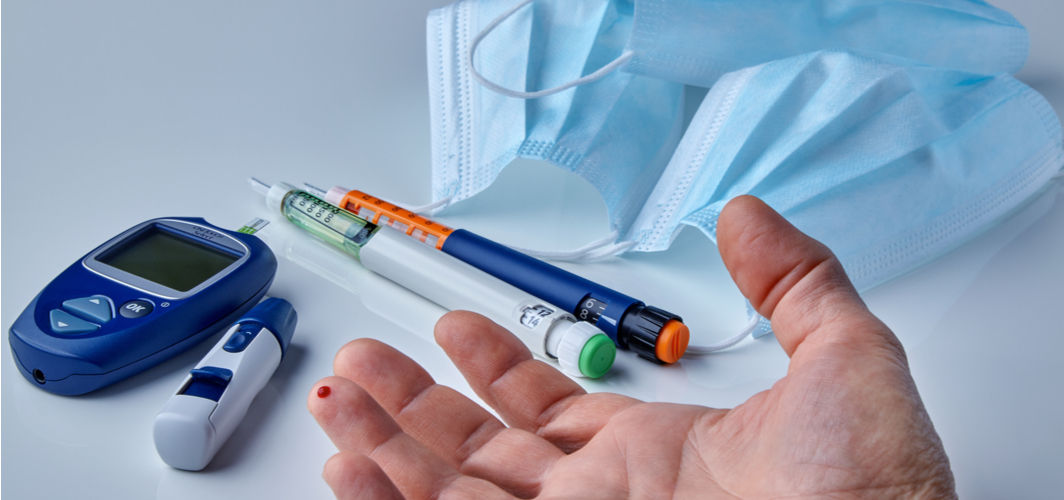Diabetes Management
Managing Diabetic Neuropathy: Tips For Relieving Pain and Discomfort
3 min read
By Apollo 24|7, Published on - 10 January 2023, Updated on - 01 June 2023
Share this article
0
0 like

Diabetics often complain of nagging pain and numbness in their legs and hands. Have you ever wondered why it happens? While diabetics can maintain their blood sugar levels efficiently with medications and a healthy lifestyle, there are several long-term complications of diabetes. One such complication of diabetes is diabetic neuropathy, which is characterized by slow nerve damage. Around 50% of people with type 1 or type 2 diabetes develop diabetic neuropathy later in life. Let us know more about the condition and how one can deal with it.
Diabetic Neuropathy Symptoms
Since diabetic neuropathy develops gradually, the condition may not cause any signs or symptoms in the early stages. However, a few common signs that you may notice as the disease progresses include:
- Sharp pain or cramping in the feet and legs
- Burning sensation in the feet at night
- Sensitivity to touch
- Coordination issues that make it difficult to walk
- Muscle weakness and wasting
- Numbness in the hands and feet
Some people experience these symptoms more at night than during the day. If you have diabetes and experience one or more of these symptoms, consult your doctor immediately.
What Are the Different Types of Diabetic Neuropathy?
Neuropathy is a medical term used to signify nerve damage. Diabetic neuropathy is of four types, namely
- Peripheral neuropathy: The most common type that usually affects the hands and legs. Its symptoms include tingling, numbness, sharp pain or cramping, muscle weakness and loss of coordination.
- Autonomic neuropathy: This type affects the nerves of the autonomic nervous system causing issues with digestion, reproduction, cardiovascular functions, and urinary bladder.
- Proximal neuropathy: A rare type of diabetic neuropathy that usually occurs in adults over 50 affecting one side of the body, mostly the thighs, hips and buttocks.
- Focal neuropathy or mononeuropathy: This neuropathy occurs when there is damage to a specific group of nerves, resulting in their weakness. It usually resolves in a few weeks to months without causing permanent damage.
How Is Diabetic Neuropathy Diagnosed?
There is no specific diabetic neuropathy test that is used to diagnose the condition. However, you may be required to undergo a few routine laboratory investigations to determine blood and urine sugar levels. A filament test or other nerve conduction tests may be performed on your feet to check for nerve damage.
Treatment and Management of Diabetic Neuropathy Pain
The treatment of diabetic neuropathy aims at reducing the symptoms and preventing further complications. Medications used to manage diabetic neuropathy pain include:
- Analgesics (pain-relieving medications)
- Anti-depressants
- Anti-convulsant
- Opioid pain medications
Since none of these medications has proven to treat diabetic neuropathy pain effectively, your doctor would also work towards lowering your blood sugar levels and slowing down disease progression.
The pain due to diabetic neuropathy can be severe and highly debilitating, often impacting your routine. The pain usually occurs in the feet and at night when your body is at rest. If you have diabetes and are experiencing any pain or tingling sensation in your hands and feet, visit an expert right away.
FAQs
1. How long does diabetic neuropathy take to develop?
Diabetic neuropathy can take several years to develop and progress slowly.
2. What kind of pain does diabetic neuropathy cause?
Diabetic neuropathy pain usually feels like a tingling sensation, numbness or burning. Some people may also feel a deep ache in their hands and feet.
3. Does diabetic neuropathy pain resolve by itself?
Unfortunately, there is no permanent cure for diabetic neuropathy or its symptoms. However, with appropriate medications, effective symptomatic management can be achieved.
4. What causes diabetic neuropathy to flare up?
High blood cholesterol, triglycerides, high blood pressure and obesity may cause diabetic neuropathy to flare up.
5. Can diabetic neuropathy be reversed?
Currently, there is no way to reverse diabetic neuropathy. However, the condition’s progress can be slowed down with medications and lifestyle changes.
Consult An Apollo Diabetologist
You can also manage your diabetes like a pro with Apollo 24|7's 12-week empower programme.
Medically reviewed by Dr Sonia Bhatt.
Diabetes Management
Leave Comment
Recommended for you

Diabetes Management
The Best Time to Exercise in Diabetes
Exercise plays a crucial role in diabetes management, benefiting both Type 1 and Type 2 diabetes individuals. The timing of exercise matters as well. For Type 2 diabetes, morning workouts should be preceded by a small meal to prevent blood glucose spikes. Conversely, people with Type 1 diabetes are advised to exercise in the morning to avoid later-day hypoglycemia. High-intensity interval training post-lunch suits Type 2 diabetes, while late evening exercise can affect people with Type 1 diabetes, mitigated with insulin adjustments. Consulting healthcare professionals for a personalised exercise plan is crucial for effective diabetes management.

Diabetes Management
A Healthy Weight is Key to Better Blood Sugar Control
Maintaining a healthy weight is crucial for better blood sugar control. Excess weight can contribute to insulin resistance and difficulty managing blood sugar levels. By adopting a balanced diet, engaging in regular physical activity, and maintaining a healthy weight, individuals can improve insulin sensitivity and enhance their ability to manage blood sugar effectively.

Diabetes Management
COVID-19 and Diabetes management: Clinical guidelines
Recently, the Ministry of Health and Family Welfare (MoHFW) has revised the guidelines on the diagnosis and management of diabetes among COVID-19 patients at patient management facilities.
Subscribe
Sign up for our free Health Library Daily Newsletter
Get doctor-approved health tips, news, and more.
Visual Stories

8 Fruits That are Incredibly Healthy for Diabetes
Tap to continue exploring
Recommended for you

Diabetes Management
The Best Time to Exercise in Diabetes
Exercise plays a crucial role in diabetes management, benefiting both Type 1 and Type 2 diabetes individuals. The timing of exercise matters as well. For Type 2 diabetes, morning workouts should be preceded by a small meal to prevent blood glucose spikes. Conversely, people with Type 1 diabetes are advised to exercise in the morning to avoid later-day hypoglycemia. High-intensity interval training post-lunch suits Type 2 diabetes, while late evening exercise can affect people with Type 1 diabetes, mitigated with insulin adjustments. Consulting healthcare professionals for a personalised exercise plan is crucial for effective diabetes management.

Diabetes Management
A Healthy Weight is Key to Better Blood Sugar Control
Maintaining a healthy weight is crucial for better blood sugar control. Excess weight can contribute to insulin resistance and difficulty managing blood sugar levels. By adopting a balanced diet, engaging in regular physical activity, and maintaining a healthy weight, individuals can improve insulin sensitivity and enhance their ability to manage blood sugar effectively.

Diabetes Management
COVID-19 and Diabetes management: Clinical guidelines
Recently, the Ministry of Health and Family Welfare (MoHFW) has revised the guidelines on the diagnosis and management of diabetes among COVID-19 patients at patient management facilities.